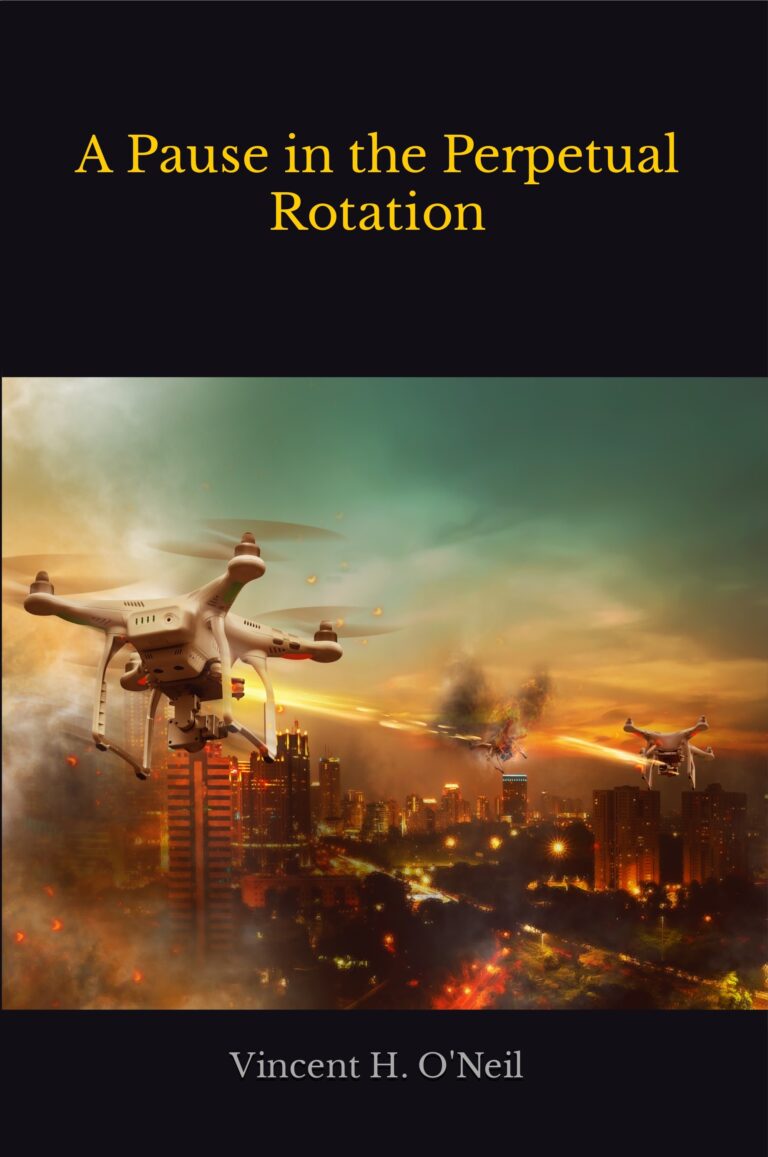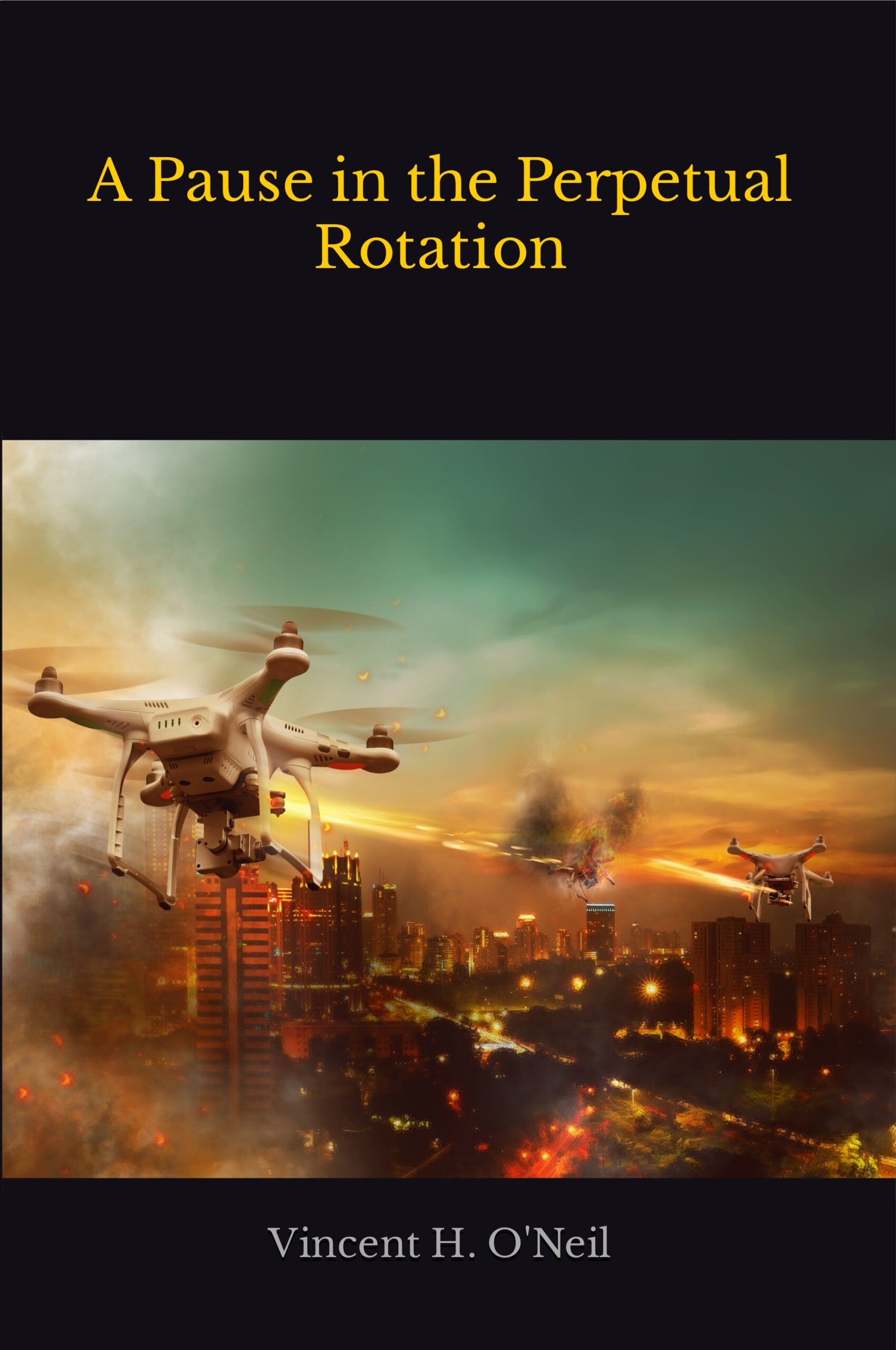Vincent H. O’Neil’s A PAUSE IN THE PERPETUAL ROTATION is set in a future where humanity has given over most control to artificial intelligences (AI) it no longer completely understands. The AIs continuously refine their own designs and protocols, making human authority over them increasingly theoretical. As a result, the sprawling government ministries that employ most of the affluent class are more focused on petty territorial battles than actual governance.
Society has become divided into three main classes, The One Percent, nicknamed the Swells, live existences of post-scarcity luxury. They discard clothing and gadgets continuously and are provided with new fashions and toys on demand by a complex AI supply chain of drones. The middle class, called the Shoals, live comfortably if not luxuriously and work in the professional realm. And the bottom layer, called Sands or Grains, live in low-class housing amidst criminal gangs and a modicum of freedom from the constant surveillance endured elsewhere. The fundamental goal of society is Contentment, and all citizens are trained to avoid conflict and maintain the status quo. Being accused of anti-contentment practices is a serious offense, and can land any citizen in the hands of the implacable AI security robots known as Marshals. Organized resistance can bring on the Jolly Rogers, security drones capable of mass electrocution.
O’Neil’s plot is complex, introducing a long cast of characters engaged in separate story threads that slowly—perhaps too slowly—come together. In a Sands neighborhood called The Holly, a teenager named Traxter infiltrates Shoal areas to spy for Muriel, the neighborhood’s unofficial leader. They plot to exploit seams in the system to improve their lives while following an underground philosophy called The Unused Path that preaches a philosophy of self-reliance and critical thinking that borders on anti-contentment (The Unused Path, it should be noted, exists as a separate non-fiction book by the same author. It’s explicitly meant to be a companion to the story, so those intrigued by the hints of it here can do a deeper dive if they wish.) Meanwhile, a thoughtful detective in the Peace Ministry, Inspector Peter Lansing, is investigating The Unused Path with his AI partner (named, irritatingly, Partner). Lansing has come to admire The Path, and his official report concludes that it is harmless—and that it might have been written by an AI attempting to guide human prisoners. Above Lansing’s pay grade, two powerful government ministers take a squabble over real estate and inflate it into a power struggle at the highest levels. One sees the criminal activities of The Holly’s residents combined with the easily misconstrued nature of The Unused Path as an opportunity to create an artificial crisis to use as leverage—an artificial crisis that will cost many Sand lives. When Lansing becomes aware of his role in this cruel, deadly deception, all the story threads begin to coalesce into an explosive climax.
O’Neil’s world-building is terrific; he explores the complexity of his future society deftly, and if his nick-names for the different social classes are a bit hokey it all works. He over-relies on expository “as you know”-style writing to explain history and underscore his themes, however. In fact, you never have to wonder if having a society built and run by AIs inevitably leads to humanity not understanding their own technology because O’Neil’s characters frequently pause to say that explicitly. Whenever these conversations (or, often enough, monologues) occur, the story grinds to a halt so characters can explain things to the reader that are fairly obvious from context, and would have been better left to interpretation. The story takes its time to come together; eliminating some of that exposition might have streamlined the plot, and the lack of an obvious protagonist makes it unclear initially what we’re supposed to be focused on. A little patience is required, but O’Neil has a plan and he manages to pull it off in the end. That makes A PAUSE IN THE PERPETUAL ROTATION an interesting and rewarding read despite its flaws.
Confident world-building and intriguing concepts in A PAUSE IN THE PERPETUAL ROTATION are somewhat undermined by expository writing and slow pacing.
~Jeff Somers for IndieReader


